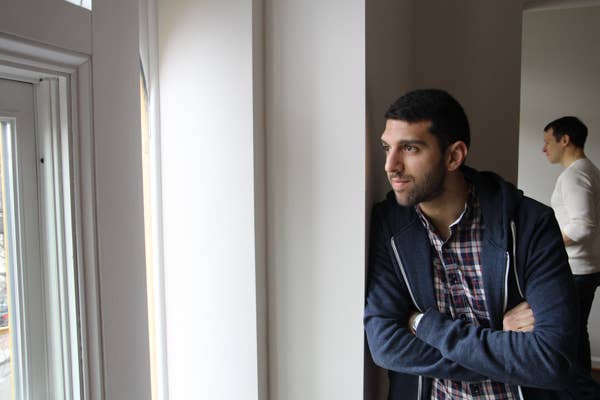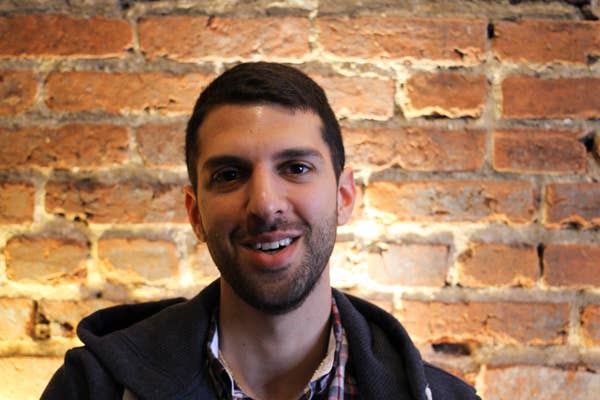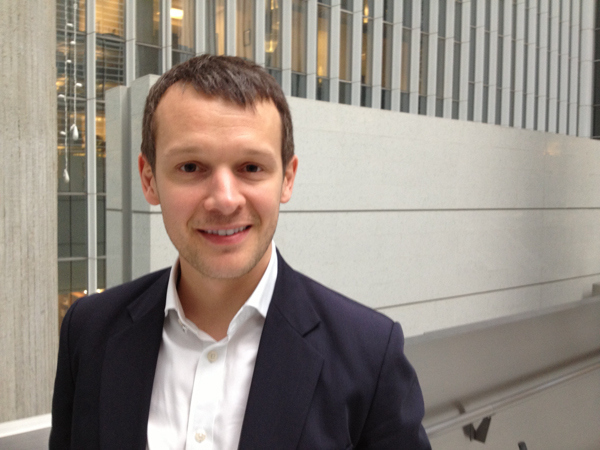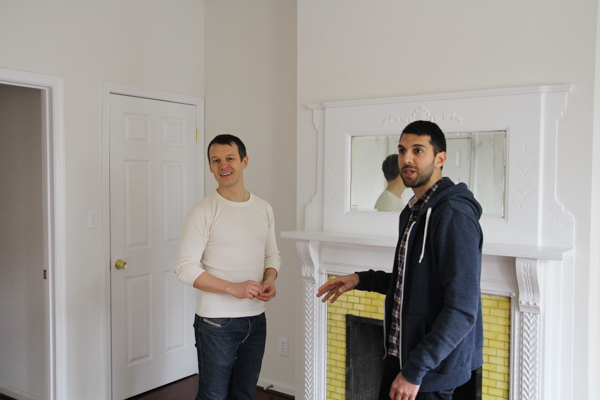
WASHINGTON — Days before moving furniture into their new house in D.C.'s LeDroit Park neighborhood, Fabrice Houdart and Roy Daiany were still arguing about where to put the master bedroom.
Roy was leaning toward the large front room on the second floor, which had a view of the newly refurbished Howard Theater on the other side of Florida Avenue. Fabrice wanted to turn the third floor into a master suite. This would give them a little space from the nursery on the second floor. In just a few months, they would be fathers.
"I'm planning to raise the children the French way," Fabrice joked. "They can come visit for a while and then come back downstairs with the nanny." Plus, the room on the third floor was closer to what Fabrice had dubbed the RuPaul's Drag Race room. It was the only spot Roy would be allowed to watch the program or another favorite, Mob Wives.
They didn't have a whole lot of time to get the house ready. They were surprised to learn five months earlier that their surrogate mother was pregnant. They hadn't expected the process to work on the first try. It often takes many tries to get an embryo to implant, and their egg donor had given them a disappointingly small number of eggs to work with. But the surrogate was not only pregnant — she was carrying twins. One is Fabrice's biological child; the other is Roy's. They are due in May.
The process of getting pregnant was miraculously easy compared with the legal nightmare that preceded it. It required consulting lawyers on three continents and spending twice what they had expected on the process. There are many more hurdles for a same-sex couple trying to build a family than just getting their union recognized, they found.
Fabrice, who is French, grew up in an upper-crust Parisian family and now works in the World Bank's Washington headquarters. His fair features make him look much younger than his 34 years. On the day they gave me a tour of their house, he was wearing a white waffle shirt and a pair of Diesel jeans with a six-inch rip in the crotch. He'd locked himself out of the house that morning and ripped his pants trying to get back in by jumping over the 8-foot-high wooden fence separating their backyard from the funeral home next door.
Roy is a 32-year-old American who grew up in New York and Tel Aviv. He is dark and stubbly and was dressed that afternoon every bit like the hipster Google employee he is: blue hoodie, plaid shirt, Converse sneakers. He liked the idea of having the master bedroom just on the other side of the nursery's door. "I want to be near my babies," he said.
Decorating the rest of the house caused less debate. A friend suggested they paint the nursery a light green rather than blue — they didn't want to oppress their sons if they turned out to be transgender. (The color would also accent the tile work around the fireplace.) Fabrice wanted to paint the front door black and strip the banisters down to their original wood; Roy didn't care — his domain was the granite-countered kitchen.
For those gay couples who want to be biological parents, they must navigate a shifting patchwork of laws governing surrogacy and in-vitro fertilization, technology that is banned or denied to same-sex couples in many places. France is one of these countries, with a law so strict that it will not grant citizenship to the children of French citizens born in countries where surrogacy is legal. Fabrice and Roy had planned to work with a foreign surrogate because the process abroad costs a fraction of what it does in the U.S. But there was a risk they would never be able to get the child out of the country of its birth if Fabrice was the biological father.
They ultimately found the resources to have the child in Pennsylvania. But their struggle reflects that once same-sex marriage is a reality, much harder questions will remain about what equality really means for same-sex couples. Does biological parenthood remain a right for same-sex couples even thought their biology makes that impossible? Will restrictions on certain types of assisted reproduction one day be regarded as fundamental barriers to full equality for gays and lesbians the way same-sex marriage has become?

Roy had long dreamed of being a father. When he was coming out at age 17, he believed he would probably have to give up on getting married. But he never thought he would have to sacrifice having a family.
"For me, really having a family and being a father was always and absolute, I always wanted it, I knew it was going to be part of my life — I never wanted to give up on that dream because I was gay," Roy told me in a boutique coffee shop across the street from the couple's new house. And though he has a lot of respect for those who adopt, he always wanted biological children. "I always dreamed of having biological children of mine and my partner's," he said.
But marriage still seemed a little weird to him.
"I never thought about myself getting married because I'm a gay man. One of the things that I gave up on is marriage," he said. The test of a mate was not whether he could imagine one day exchanging rings with him — it was whether "you can picture your life in 20 years with you and him, sitting in the living room, reading the newspaper while the kids run around."
Before Fabrice started dating Roy, he didn't think either fatherhood or marriage was in his future. When he came out to his parents at 24, he recalls his father saying, "Well, it's very easy to be gay when you are young, but when you are old … you age alone." Much of his family remains chilly toward his relationship to Roy; his grandfather recently marched in the protests against France's impending legalization of same-sex marriage and then posted pictures of it on Facebook.
When I met Fabrice one afternoon in the atrium of the World Bank's glass-and-metal headquarters by the White House, he told me he'd believed that a long-term relationship "was not something that was in the cards." He had a hard time imagining a future, even after he started dating Roy in 2008.
"I have been a very unhappy gay man for years, and I thought my life would be over at 30," Fabrice said. His struggle with these doubts delayed their plans to start a family. But by New Year's Eve of 2012, the couple felt ready to move ahead. "He was feeling better and healthier, and [it seemed like] he felt like he was in the best place of his life," Roy remembers.
Roy ultimately did ask Fabrice to marry him. He surprised him on his birthday with a ring with three interlocking gold bands modeled on the one French poet Jean Cocteau gave to his lover.
"That's the only day that I really started to really relax," Fabrice said; he could count on a future with Roy. And having children on the way has gone further in erasing the shame he felt about being gay. "I'm so proud," he said.
Fabrice and Roy have had to postpone their wedding — they'd picked out a date in May before they learned that was when their twins would be born. By the time they finally tie the knot, same-sex marriage could be fully legal in both the United States and France.
But many of the roadblocks to parenthood that they've encountered will remain even if their marriage is given the force of law.

Assisted reproduction pushes many of the same buttons as abortion in some countries. While in-vitro fertilization is legal in most countries, several, like France and Italy, only allow married, heterosexual couples to access the procedure. Gay male couples who need a surrogate to carry a biological child face even greater restrictions. Countries like China and Germany ban surrogacy outright, and several more make it illegal to pay a woman for carrying a child.
The landscape isn't simple for those who want to work with a surrogate in the United States, either. Fabrice and Roy could technically have faced jail time if they had hired a surrogate in their hometown. The District of Columbia is the only jurisdiction where contracting a surrogate is a criminal offense, but such contracts are banned or unenforceable in several others. They also couldn't have worked with a surrogate in Virginia. Like many other states, including Texas and Utah, Virginia only allows surrogacy for married heterosexual couples.
"Surrogacy in general, it's very state-by-state, country-by-country," said Meryl Rosenberg, of ART Parenting, a Maryland attorney who specializes in surrogacy arrangements. "You have to be really, really careful."
Fabrice and Roy went into the process assuming that they would work with an Indian surrogate. It costs less than half what surrogacy costs in the United States, and they knew other couples had gone this route. But they decided India was too risky after consulting with their lawyers. If the child was Fabrice's, France would not grant the child citizenship and Roy wouldn't be able to get the child U.S. citizenship either, because the U.S. government wouldn't recognize him as a parent. There was a possibility that India might also refuse to recognize the child as an Indian citizen too, which could mean an even more serious legal headache.
"I had to really ask if there was a really a big risk [that] my kids [could] not have any nationality or be stuck in India in an orphanage until I find a way to get them out of there," Fabrice said.
Being unable to use an Indian surrogate may have been a blessing in disguise. India recently enacted rules barring same-sex couples from going there to have a child. But unless they were willing to only use Roy's sperm — and they wanted chance to decide who would be the father — having the child anywhere outside the country was going to be risky. Fabrice could still technically face problems getting his child French citizenship if the child is born in the U.S., which is important the child ever wanted to live in Europe or study at a French university. But Fabrice's lawyer expects the French government will ultimately defer to the U.S. government's recognition of his paternity.
Couples who live in countries where surrogacy is illegal are not so lucky. In February, a couple from Israel got worldwide attention when they put a video online asking for contributions to help them continue finding a way to have a child around Israel's bans on surrogacy and adoption. They had spent $120,000 in their seven years of trying to become fathers without success.

Despite their difficulties, Fabrice and Roy have been incredibly fortunate. Not only were they able to come up with the more than $100,000 to hire a U.S. surrogate, but, they joke, they're getting two kids for the price of one. They had the money to buy a house when they realized the second child meant their apartment would be too small. And child care will be considerably easier and cheaper because Fabrice's visa status gives him the right to hire a live-in nanny from abroad.
They are also fortunate to work for employers that will give them generous paternity leave. The World Bank even has a specific policy for surrogate parents granting them 70 days of leave, the same amount of time given to parents of newborn biological children.
However, Fabrice is still frustrated where he perceives unequal treatment. World Bank employees who give birth to more than one child are entitled to an additional 20 days of leave, and he is fighting to access that benefit. Bank spokesman David Theis said this is a separate medical benefit for mothers who give birth to twins and its application has nothing to do with sexual orientation; a lesbian mother would be able to access it and a straight couple having children by surrogate would not.
But Fabrice says it's discriminatory to create a benefit that a gay couple can't access. Plus, they've had plenty of unique difficulties in having their twins, and the Bank should take that into account.
"My point of view is that it's very hard to create your own family as a gay man, and you're already starting from a pretty low point," he said. "The reaction of my parents, the reaction of society … and plus the emotional journey of surrogacy, which is a difficult one."
Although there isn't a lot of data on how common families like Fabrice and Roy's are, they seem to be growing in number. A recent study by UCLA's Williams Institute found that 27.4% of all lesbian couples and 10.6% of gay male couples are currently raising children. The percentage is even higher among couples who consider themselves married: 34.5% of lesbians and 27.9% of gays. International surrogacy is also a booming trend: A recent survey of five surrogacy agencies reported a 1,000% increase in international arrangements in just the past four years.
Fabrice doesn't expect the dispute over the additional leave to be resolved until after the kids are born. Right now they're mainly just scrambling to get the house ready. Any improvements they want to make to the house have to be done before their children arrive, and they have to do the work themselves.
After the cost of the surrogacy and the house, Roy said, "We don't have any money left to pay someone to do it. When we were making the down payment, we held the couch upside down and shook the change out — we were paying the down payment with change."
Fabrice has claimed a room at the back of the house, just off Roy's kitchen, for his library. He's planning to use it to enjoy an indulgence he had given up to save for the kids: his newspaper subscription.
While the kids run around, he said, "I'm going to take a subscription to The Washington Post and sit in here reading."
J. Lester Feder is a BuzzFeed contributor and a 2013 Alicia Patterson journalism fellow.
